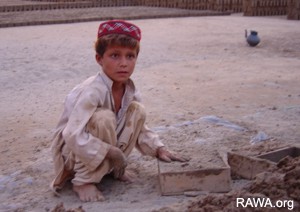Al Jazeera has discovered that thousands of children, some as young as aged four, are being forced to work in brick factories in Afghanistan.
In the Sokhrod district in the east of the country, which is well known for producing bricks, there are about 38 factories and about 2,200 children are believed to be working in them.
"I don't want to do this with my life. I want to go to school, but I cannot because I am poor," 10-year-old Shafiq Ola told Al Jazeera.


IRIN News, January 16, 2007: A survey released by the AIHRC revealed that 60 percent of families surveyed stated that almost half their children were involved in some kind of labour.
"My family is in debt for $800 and I have to work."
Many of the children were forced into the brick factories after their parents became indebted to the owners.
"They are bonded labour, I am holding them," Mohamed Gul, the owner of one factory in the area near Jalalabad, said.
"They don't have any other option they have to, like a slave, work for me. Each family owes me thousands of aghanis [the Afghan currency]. They have to pay me with their work."
Money to survive
Al Jazeera's Teresa Bo, reporting from Sokhrod, said that many of the families working at the brick factories find it difficult to pay off their crippling debts as they earn as little as $6 a day and need the money to survive.
The government has said that it is encouraging aid agencies and other non-governmental organisations to help free the indebted families from their bonds.
However, the workers at the brick factory expressed doubts that they would receive any government assistance.
"If we don't pay them [the factory owners], they won't let us go. They are powerful people, they have guns and they know powerful people in the government," Qari, a brick-maker, said.
"My life is destroyed, I'm worried about the future of my children."
The children work between eight and 12 hours a day, often in dangerous conditions.
Al Jazeera saw one boy injured during its short visit to a factory when a pile of bricks feel on him.
The United Nations Children's Fund (Unicef) estimates that about 30 per cent of five to 14-year olds in Afghanistan are involved in some form of labour.
Education suffering
Despite a massive increase in school enrollment after the fall of the Taliban government in 2001, almost half of the country's youth (15- to 24-year olds) are illiterate, according to Unicef.
This problem could be worsened as children miss out on education to help support their families.
"While we are in debt, we cannot study. I have to work to pay my family's debts and our expenses. But, one day, I want to be a teacher to teach others," 12-year-old Akhar Khan said.
Safia Siddiqi, an member of the Afghan parliament from the local province, told Al Jazeera that the government had "strictly forbidden" child labour across the country but that many still had to work because of the poor circumstances of their families.
"I think this is the responsibility of the government ... to take immediate action regarding the slavery which is going on in the district," she said.
"The poverty rate is very high in Afghanistan ... we should provide something for the families, for the mothers, for the parents to feed the children and send them to school."



